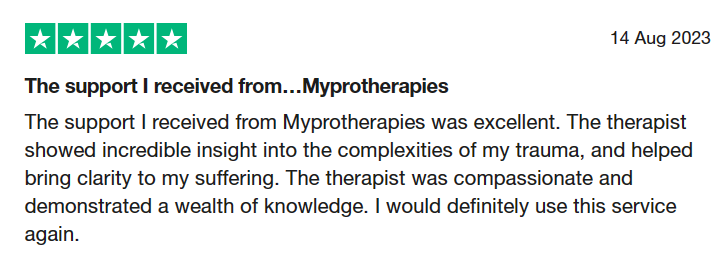Charlie Carroll
CBT Psychotherapist
HCert, BSc, PGDip, MSc
Current Postgraduate Student at the University of Nottingham, Academic Unit of Mental Health and Clinical Neuroscience, Division of Applied Psychology
Myprotherapies offers bespoke consultancy for organisations and professionals — from clinical supervision and psychological input, to workplace wellbeing, compliance, and training.
6+ years in mental healthcare, with experience spanning therapy, supervision, and complex case input.
3+ years in organisational business, including consultancy on wellbeing strategies, policy, and professional development.
3+ years in software and technology, working across digital solutions, AI applications, and tech-enabled service delivery.
-
We provide specialist input for professionals and services working in mental health and wellbeing. This can include supervision, independent advice on complex cases, outpatient therapy provision, or drawing on forensic psychology expertise where specialist perspectives are required. The focus is on supporting reflective practice, managing complexity, and strengthening decision-making across clinical contexts.
-
Our consultancy supports organisations looking to improve wellbeing, resilience, and governance. This may involve helping to shape wellbeing strategies, reviewing or developing policies, or providing training and development opportunities for staff teams. The aim is to embed effective, evidence-based approaches that fit the needs of your setting.
-
Beyond clinical work, we offer professional input across research, education, and governance. This might include contributing to projects, delivering talks or workshops, or advising on ethical and compliance matters. The consultancy is designed to add value in a flexible way, wherever psychological knowledge and professional expertise can support your goals.
-
Tailored consultancy for unique professional or organisational needs.
Flexible support designed around your objectives.
One-off input, short-term projects, or longer-term collaborations.
Why Choose Us
Our consultancy is led by Charlie Carroll (HCert, BSc, PGDip) — a CBT Psychotherapist with over 6 years in mental healthcare, 3 years in organisational business, and 3 years in software/tech.
We are grounded in professional standards and governance. Our consultancy is accredited through BACP, BABCP, and BPS, with organisational membership of BACP, and full ICO registration (ZB588301). The website is SSL-secured, ensuring that all engagement is handled with professionalism, safety, and confidentiality. This framework underpins our commitment to ethical, reliable, and effective consultancy.
Our Consultancy
-
Individual Practitioners Memberships / Accreditations:
BPS - GMBPsS - Graduate Member ✓
BACP - Individual Member ✓
BABCP - Individual Member ✓
HCPC Accreditation Conferred on Completion of DForenPsy ✓
-
The British Association for Counselling and Psychotherapy
Organisational Membership, No: 00276669 ✔
ICO Organisational Registration, No: ZB588301 ✔
SSL Secured ✔
-
Where We Have Worked / Our Institutions
Include but not limited to:
University of Manchester Students Union ✔
University of Manchester Psychology Soc ✔
University of Liverpool School of Psychology ✔
University of Nottingham School of Medicine ✔
Testimonials








